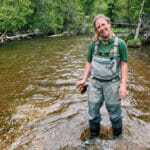Trout Unlimited recently wrapped up a multi-year project to create and restore critical wetlands in the Rogue River watershed in southern Michigan.
This fall, two more “pocket” wetlands were restored, making a total of four wetland restoration projects over the past three years. Pocket wetlands are small areas that boast large benefits for water quality in this case because of their priority location adjacent to coldwater trout streams.
The Rogue River is a major tributary of the Grand River and features an outstanding combination of cold, cool and warm waters, which support a high range of biological diversity as well as diverse fisheries.

However, the Rogue River watershed lies in the urban shadow of one of the fastest growing areas in Michigan. The pressures from growth and development could negatively impact the productivity and diversity in this watershed.
The tributaries, which help the Rogue River maintain its excellent water quality, are particularly vulnerable to significant land conversion from rural to urban use. As a result, fluctuating water temperature and sedimentation are serious issues in the Rogue River and its tributaries.
Simultaneously, the watershed has lost critical wetlands which provide essential services for healthy water. Wetlands perform key functions for a watershed such as floodwater storage, groundwater recharge, filtration of pollutants, nutrient recycling, biological productivity, wildlife habitat and climate resiliency.

To address increasing water temperature, sedimentation and wetland loss, Trout Unlimited sought funding from the Michigan Department of Environment, Great Lakes, and Energy (EGLE) to restore priority wetlands that will provide important water quality benefits to the Rogue River and its tributaries.
With funding from EGLE and help from community partners like South Peat Environmental, Trout Unlimited utilized the Landscape Level Functional Wetland Assessment Tool to identify areas of historic wetland that had restoration potential and could offer the highest benefits for water quality.
In total, Trout Unlimited and partners restored four small but impactful wetlands. Each were planted densely with native Michigan wetland plants grown by Plaster Creek Stewards. Three are located along Cedar Creek in downtown Cedar Springs, where impervious surfaces are impacting the creek. One is within the Oaks of Rockford development in the headwaters of Becker Creek, a tributary to Stegman Creek which flows into the Rogue River, which has historically been impacted by development.
Combined, their size totals just about one acre, but their targeted locations will ensure that harmful, polluted, and warmed stormwater runoff will be soaked up, filtered and cooled down by these wetlands before entering sensitive coldwater trout streams.

EGLE awarded Trout Unlimited more than $200,000 in grant funding for this urban wetland restoration initiative in the Rogue River watershed. The City of Cedar Springs and the Cedar Springs Community Building Development Team has also contributed $22,000 to this project.
Trout Unlimited looks forward to seeing these wetlands mature and flourish with native Michigan plants, providing benefits not only for local water quality but also for wildlife, pollinators, the economy, and community health and vitality.
This project has been funded wholly or in part through Michigan Department of Environment, Great Lakes, and Energy’s Nonpoint Source Program by the United States Environmental Protection Agency.



